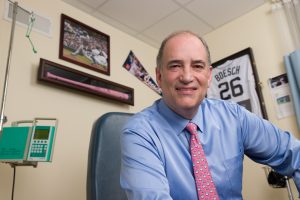
Cape Cod Oncologist Victor Aviles, MD: Offering Hope to Cancer Patients, Ballplayers, and Many More
Dr. Victor Aviles, a compassionate Cape Cod oncologist bringing hope and advanced cancer care to the community.
HIPAA Alert: Potential Data Breach Learn More
Questions on Oncology, Hematology and/or Infusion Clinical Services due to COVID-19 Crisis – CALL 833-698-1623
Important Information for Our Patients Regarding the Coronavirus.
RCCA Providing Area Cancer Patients with Access to Care During Coronavirus Outbreak
RCCA Offering Patients Virtual Visits During Coronavirus Pandemic
Alizah Diamond, General Counsel for Regional Cancer Care Associates, the New Jersey-based and physician-owned specialized health care provider, has helped the young organization accomplish an ambitious agenda.
But Diamond, who continues to function as a one-woman legal team playing a major role in RCCA’s complicated expansion endeavors in the mid-Atlantic and New England regions, admits that “this job found me. I wasn’t looking for it, and I wasn’t a health care attorney. But (Terrill Jordan) told me, ‘You come from an oncology family and have a fundamental understanding of what we are trying to accomplish.’”
Jordan, RCCA’s only in-house lawyer, was promoted in 2017 to president and CEO, and a search began to find his replacement. The ideal candidate would not only be versed in legal matters and corporate transactions, but also oncology and hematology.
With more than 125 physicians and hundreds of other health care professionals practicing at more than 31 locations throughout New Jersey, Connecticut, Massachusetts, and the Washington, D.C., area RCCA, founded in 2012, provides leading-edge, individualized and highly compassionate care for cancer and blood disorders.
Family tradition and considerable experience helped Diamond qualify for her prominent RCCA position: Both Diamond’s brother and father are oncologists.
Her father is Dr. Richard M. Diamond. She refers to him as the last solo practicing physician of his kind and an oncologist stalwart in Cornwell, N.Y., with patients who include veterans and West Point personnel. Her brother, Elan Diamond, is Chief of Outpatient Cancer Care at Holy Name Medical Center in Teaneck, N.J.
Alizah Diamond picked up much cancer knowledge throughout her upbringing. Today, father and brother on occasion seek her pro bono advice on compliance matters and related issues, but they’ll return the favor when she needs a physician’s insight.
Diamond also leaned toward medicine as a John Hopkins University undergrad. But ultimately, her path led to Georgetown University Law Center. After earning her law degree in 2005, Diamond practiced litigation and labor and employment law with Hodes, Ulman, Pessin & Katz for almost two years, then served a similar role at Schnader Harrison Segal & Lewis LLP from 2007 to 2016.
An Updated Business Model
After 11 years of litigation and corporate law at a couple of firms, Diamond was welcomed aboard at RCCA and given an extensive to-do list with an August deadline.
If RCCA was to become one of the nation’s largest independently owned cancer care networks, it would have to update its business model. That had Diamond restructuring the association into four segments:
Diamond, with assistance from the Philadelphia firm of Fox Rothschild LLP, beat the deadline, completing possibly the most detail-intense project of her career.
“When I got here, we were one company, but each of those segments meant creating a new company,” she told The Vanguard Group. “That was a lot of moving parts having to go in the right direction at the right time, and being part of a small management team, I had to get my hands dirty and wear a lot of hats.”
The compliance aspect of health care regulations seemed all-consuming. The federal Health Insurance Portability and Accountability Act of 1996 (HIPAA) employment law and data privacy were just some of the matters to be addressed, and as RCCA extended into a new jurisdiction, it would be met by a new set of rules. New tax IDs had to be secured for all entities. Contracts with dozens of insurance companies needed revisions, and new governance documents had to be drawn.
Managing Mergers and Acquisitions
RCCA’s work force was growing, employees would be shifted into one of the four segments and each segment would need its own plan for cash flow, accounting and billing.
Then in 2017, Diamond would oversee the acquisition of six Connecticut-based cancer specialists, giving RCCA a presence in West Hartford and Manchester and the doctors’ affiliations at three hospitals. That would be followed by the addition of five doctors’ associations in New York and, early last year, a partnership with Princeton Radiation Oncology (PRO) that marked RCCA’s first acquisition of a free-standing facility.
RCCA’s specialty being medical oncology and PRO noted for radiation oncology, a seamless and comprehensive system of cancer care is now available at 12 locations throughout the Garden State, Diamond says. RCCA also having hospital-based contracts in and at MedStar Georgetown University Hospital, its presence just expands along the East Coast and Diamond anticipates the growth will continue.
“I would like to think we’ll keep expanding, even become the biggest independent network in the country,” she says. “And while there are pros and cons about being in-house, I prefer it because it lets me focus on the legal and business aspects.”
Applying Her Skills in the Community
Though she’ll never fight cancer from the clinical side, Diamond battles the disease not just as RCCA’s general counsel but through her extracurricular activities.
A married mother of two small children, she is the secretary of SHARE, a self-help nonprofit that assists those afflicted by breast and ovarian cancer, and a board member of Care Plus NJ, which reaches out to people suffering from mental problems and substance abuse. Both causes entail going into under-served communities.
Seems ironic, Diamond says, how this one-time pre-med student wound up applying her skills for a growing oncology and hematology network that now includes over 125 doctors, 1,000 employees and 31 locations. The word “fate” also pops up in her conversations.
“At any rate, I’m glad the job found me,” she says.
Radon. While a small amount of radon outside is harmless, if it leaks above ground or accumulates in a home or other buildings, it can damage lungs. An odorless radioactive gas created by the breakdown of uranium, radon is found in soil, rocks and groundwater and is the second-most common cause of lung cancer, after smoking. It causes approximately 20,000 cases of lung cancer each year, according to the Environmental Protection Agency.
Secondhand smoke. Secondhand smoke increases the risk of lung cancer by 20% to 35%, according to the CDC. The more prolonged or intense an individual’s exposure, the higher the risk. According to the CDC, secondhand smoke kills more than 7,300 nonsmokers in the United States every year.
Chemicals. Extended exposure to arsenic, asbestos, chromium and other toxic chemicals has been linked to lung cancer. Those who work in settings in which they are exposed to these cancer-causing agents, as well as industrial chemicals such as paints, solvents, tinners, diesel exhaust and fumes generated by coal or wood cooking, are at an increased risk. Also posing a threat is arsenic, which occurs naturally in rocks and soil, and can contaminate drinking water that comes from private wells.
Radiation. Individuals who undergo high-intensity radiation have an increased risk of lung cancer.
Air pollution. High ozone levels and particle pollution due to extreme heat and wildfires are contributing to unhealthy air, according to a 2021 report from the American Lung Association. Fine particulate matter has been linked to lung cancer.
A gene mutation. Some individuals who do not smoke, but are diagnosed with lung cancer, may have a damaged gene. One common abnormality, or mutation, happens in the epidermal growth factor receptor (EGFR) gene.
Another area of concern is family history, and some studies indicate that the human papillomavirus (HPV) may be a risk factor, but other studies have been unable to find a link. However, both potential risk factors need further study to see if there is a connection.
Dr. Horkheimer said he is particularly concerned about vaping and electronic cigarettes, which deliver concentrated nicotine and other carcinogens to varying degrees.
“Vaping is a relatively young habit within the last decade or so, so we really haven’t seen the ramifications,” he said. “I’ll be surprised if there is not an increased incidence of cancer in e-cigarette users, but time will tell. We won’t know the real cancer risk for another 20 or 30 years for youngsters who started out vaping instead of smoking cigarettes. And then there are the older folks who for some reason thought they would quit smoking and go on to vaping. The effect on them will be difficult to tease out.”
Another risk factor is sex. Dr. Horkheimer noted that lung cancer is more common in female nonsmokers than in male nonsmokers, adding that male nonsmokers are more likely to die of the disease.
For more information or to schedule an appointment,
call 844-346-7222. You can also schedule an appointment by calling the RCCA location nearest you.

Dr. Victor Aviles, a compassionate Cape Cod oncologist bringing hope and advanced cancer care to the community.

The 20th Annual Hope Music Fest, presented by the Hope Community Cancer Center division of Regional Cancer Care Associates (RCCA), returns for a night filled

In 2011, community-based cancer specialists were celebrating rapidly improving developments for their patients. But at the same time, the outlook for their practices was less

Regional Cancer Care Associates is one of fewer than 200 medical practices in the country selected to participate in the Oncology Care Model (OCM); a recent Medicare initiative aimed at improving care coordination and access to and quality of care for Medicare beneficiaries undergoing chemotherapy treatment.